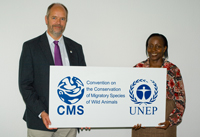New Interim Management in Place for CMS
 Elizabeth
Elizabeth
Maruma Mrema has been appointed Officer in
Charge of the Convention on Migratory Species (CMS) by Achim
Steiner, UN Under-Secretary General and Executive Director
of the UN Environment Programme (UNEP) as of 27 July 2009.
In addition, Mr. Steiner has appointed Bert
Lenten, the current Executive Secretary of
the African-Eurasian Migratory Waterbird Agreement (AEWA)
Secretariat as Acting Deputy Executive Secretary of CMS,
effective since 2 July 2009.
Ms. Mrema succeeds
Rob Hepworth, who had served as Executive
Secretary of CMS for over 4 years, while Mr. Lenten has
taken over from Lahcen El Kabiri who was recently transferred
to Abu Dhabi to be the head of the new CMS Office dealing
with the Agreements on birds of prey and dugongs.
The new management arrangements for the
CMS Secretariat have been put in place by the Executive
Director of UNEP to ensure a smooth transition until the
recruitment process for the new Executive Secretary and
the Deputy Executive Secretary position are completed.
The CMS Secretariat staff is looking forward
to working with both Ms. Mrema and Mr. Lenten as they lead
the CMS Secretariat in the coming months.
Elizabeth
Maruma Mrema, Officer in Charge of CMS
 Elizabeth
Elizabeth
Maruma Mrema, a national of the United Republic of Tanzania,
has many years of experience as a career diplomat and senior
environmental lawyer at the United Nations Environment Programme
(UNEP) with a particular focus on international environmental
law, compliance and enforcement of environmental conventions
as well as international environmental negotiations.
She is currently a Principal Legal Officer
in UNEP and since 2007, she had been the Chief of the Biodiversity
and Land Law and Governance Unit in the UNEP-Division of
Environmental Law and Conventions (DELC) as well as the
overall Coordinator of € 21.45 million Project on Capacity
Building for the Implementation of MEAs in the African,
Caribbean and Pacific Countries (ACP).
In 2007, Ms Mrema was the recipient of
the first ever UNEP-wide Best Manager of the Year Award,
which she received in the context of the UNEP Baobab Staff
Awards programme initiated by the Executive Director of
UNEP. The "Baobab Awards" were established in
2007 to recognize and reward exceptional performance and
dedication to achieving the goals of UNEP and gives UNEP
staff members the opportunity to express their appreciation
for the achievements of their colleagues. It takes its name
after the Baobab Tree, which symbolizes strength, power
and resilience.
From 2005 - 2007 she was Senior Legal Officer
and Chief of the Multilateral Environmental Agreements (MEAs)
Support and Cooperation at UNEP- DELC, where she was also
responsible for the Convention on Migratory Species (CMS)
and its related Agreements. As the head of the UNEP-DELC
Biodiversity related MEAs, Ms. Mrema has been dealing with
a number of day-to-day activities and issues of CMS and
its agreements from the UNEP headquarters perspective. Over
the past two years she represented UNEP at many of the major
CMS conferences and meetings of the parties of CMS-related
agreements, including AEWA MOP4 (September 2008) and CMS
COP9 (December 2009).
Until end of August 2005, she was the Task
Manager and Coordinator of a US$ 6.5 million Project on
Capacity Building for the Development and Implementation
of Environmental Laws and Institutions in Africa as well
as Acting Chief of the Implementation of Environmental Law
Branch in the UNEP-Division of Environmental Policy Implementation
(DEPI). For the years between 2003 and 2005, she was also
simultaneously responsible for the coordination and implementation
of a US$ 2.5 million Project on Compliance with and Enforcement
of MEAs. Between 1995 to 1999, she served as the UNEP interim
secretariat for the regional 1994 Lusaka Agreement on Cooperative
Enforcement Operations Directed at Illegal Trade in Wild
Fauna and Flora and continued to serve as the UNEP focal
point for the implementation of the Agreement.
Before joining UNEP, she worked as a lawyer
and career diplomat with the Tanzanian Ministry of Foreign
Affairs and International Cooperation as the Legal Advisor
for over thirteen years (1981-1994). She was a part-time
Lecturer in Public International Law and Conference Diplomacy
Courses at the Centre for Foreign Relations and Diplomacy
in Tanzania (1986-1990). Until recently, she was also a
visiting lecturer at the Faculty of Law, University of Nairobi
and a tutor for different environmental law topics at the
International Development Law Organization (IDLO), Italy.
Currently, she is one of the key organizers and lecturers
at the annual UNEP-University of Geneva Certificate of Advanced
Studies in Environmental Diplomacy as well as UNEP-University
of Joensuu Diploma Course in International Environmental
Law-Making and Diplomacy.
Ms Mrema holds an LLB (Upper Second Honors)
from the University of Dar-es-Salaam, United Republic of
Tanzania; LLM from the Law School at the Dalhousie University,
Canada and Postgraduate Diploma in International Relations
and Diplomacy (Summa Cum Laude) from the Centre of Foreign
Relations and Diplomacy in Dar-es-Salaam. She has published
several articles related to international environmental
law, compliance and enforcement of conventions and developed
a number of environmental law and negotiation tools, handbooks
and guidelines currently being used in a number of UNEP
organised and other training programmes.
Bert Lenten, Acting CMS Deputy Executive
Secretary
 Bert
Bert
Lenten, a Dutch national, is the Executive Secretary of
the Agreement on the Conservation of African-Eurasian Migratory
Waterbirds (AEWA). The Agreement was developed by the Government
of the Netherlands in the early nineties under the auspices
of the Convention on Migratory Species (CMS). Bert Lenten
entered on duty as Executive Secretary of AEWA in January
1996 and has made a significant contribution to the successful
development of the Agreement since then.
AEWA is the largest Agreement developed
under the auspices of the Convention on Migratory Species
(CMS) and has rapidly grown and developed into a successful
and internationally recognised instrument for trans-boundary,
multilateral waterbird conservation in the African-Eurasian
region. Under Bert Lenten’s leadership, over half
of the 119 Range States covered by the Agreement area have
now joined AEWA as Contracting Parties. Furthermore, AEWA
is increasingly recognised as one of the most effective
instruments for flyway-scale cooperation on the conservation
of migratory waterbirds across Africa and Eurasia.
In 2006, Bert Lenten also took the lead
in organising the World Migratory Bird Day (WMBD) initiative
in close cooperation with the Convention on Migratory Species
(CMS). The global campaign devoted to celebrating migratory
birds and for promoting their conservation worldwide is
one of the most ambitious awareness-raising campaigns ever
conducted by the AEWA Secretariat and has managed to stimulate
an increasing number of events celebrated around the world
each year.
Mr. Lenten has also played a leading role
in the development of the UNEP-GEF African-Eurasian Flyways
Project; also known as the Wings Over Wetlands (WOW) Project.
This US $ 12 million project is currently in the implementation
phase (for more information please see: www.wingsoverwetlands.org).
As a Dutch civil servant specialising in
forestry and nature conservation, Bert worked for the Dutch
Ministry of Agriculture, Nature and Food Quality from 1981-2000.
During this period he was responsible for providing advice
to private landowners on the management of forests and nature
areas, for the establishment of a National Park, for the
afforestation of several areas around Amsterdam, and for
the development of nature and forest policies at regional
level.
Mr. Lenten holds a Bachelor Degree in Forestry
and Nature Management.
Dernière mise à jour le 16 Juin 2014


